Hold the Roses (3 page)
Authors: Rose Marie

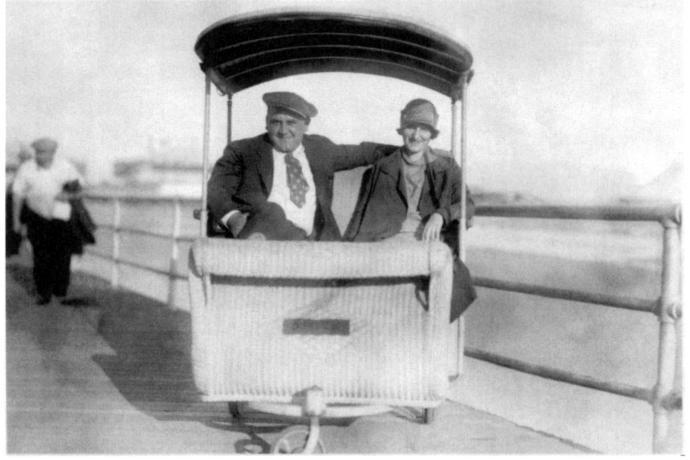
My father, Frank Mazzetta, and my mother, Stella Gluscak
On my father's side, both of his parents were born in and
Joseph Mazzetta. My father was born in New York. He had many jobs
during his lifetime. He was a suit cutter, and was with "the boys" when
they were trying to get everybody to join the union. Anybody who didn't
join, they would go and bomb that person's place. He also claimed to be
part of a trio that played with George M. Cohan in one of his big shows,
but I never did believe that. Another of my father's "positions" was manager, or owner, or bouncer, of the Diana Ballroom.
My mother was a happy-go-lucky girl, weighing 90 pounds soaking
wet, and quite attractive. She loved the theater, music, dancing, and all the
glitter of show business. She used to go to the Diana Ballroom to dance,
but she always went with a bunch of girls. My father saw her, a cute girl of
seventeen, and took a liking to her. He would set up contests so my mother
would win. Bless her heart, at that time she was so gullible and naive. This
guy had her dance with George Raft (I checked this out with George when
I went to Hollywood ... you'll hear more about this later) and Rudolph Valentino (I couldn't check this out; he was long gone by then). My mother
always swore that she did indeed dance with Valentino.
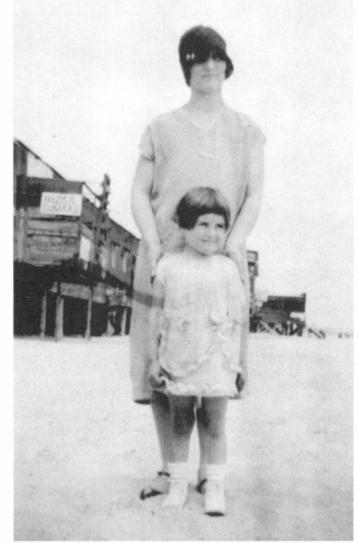
Mother and me, Atlantic City, New Jersey
My mother used to take me to the Jefferson Theater on 14th Street
and to the Academy of Music to see the movies and vaudeville shows. I
would come home and sing all of the songs I had heard for my grandparents. They would applaud, fuss over me and say how wonderful I was. I
would say, "I have to go upstairs and sing for the Polish people on the third
floor." It was those wonderful Polish neighbors who entered me in the
amateur contest at the Mecca Theater. In fact, they bought the dress I wore
and the gold-brocaded Mary Jane shoes-which I still have. (I treasure
them very much, and I smile whenever I look at them.)
My mother was petrified. "I don't know if she'll sing in front of a lot
of people or cry or just not want to sing."
The neighbors said, "She sings for us and we're an audience. She'll
sing."
Well, I won the contest. How can you beat a three-year-old kid who
sings like Sophie Tucker? I think the prize was twenty dollars. My father
heard about my victory and quickly became part of the picture. He took
my mother and me to Atlantic City. He had relatives there. We stayed for
a little while. In those days, nightclubs were family restaurants, with dancing and a floor show.
One night we went to the Little Club. Evelyn Nesbit was a showgirl
who was known as "The Girl in the Red Velvet Swing" and was also involved in what was later called the biggest scandal of the early years of the
century. Her boyfriend had shot her husband over her. Evelyn was the star
of the show. While she was singing, I of course started to sing with her. She
was very upset, but I kept on singing with her. She finally came over, took
me by the hand and led me to the microphone, and I sang. Boy, did I sing!
Everybody started throwing money on the stage-lots of money. I was
such a big hit. Some of the waiters picked up the money and gave it to my
mother. I think that's the only time she got every penny of what I earned.
Backstage, Evelyn Nesbit said to my father, "What's her name?"
My father said, "Dainty Rose Marie."
She said, "She is a baby, call her Baby Rose Marie." And that's how I
became Baby Rose Marie! (Until I was fifteen!)
My mother immediately went on the Boardwalk and bought me a
red felt coat with large, white angora polka dots with a cloche hat and bag
to match. It must have cost everything I made at the Little Club. Whether
it did or not, I wore it until the polka dots fell off.
Word got around town about this three-year-old kid who sounded
like Sophie Tucker, with a raspy, grown-up voice. I never sounded like the
Shirley Temple "Good Ship Lollipop" type. I have the voice today that I
had when I was a child. I started singing at parties, clubs and the Ambassador Hotel, one of the finest hotels in Atlantic City. In fact, I sang there in
a big show on New Year's Eve.
By now, Radio Station WPG asked my father to come and talk to
them about me. I remember it was at the Steel Pier, which is still a big
attraction in Atlantic City. We went over and I sang. They wanted me to
go on the radio twice a week. I stood in a glass booth, facing the Boardwalk
so that everyone could see this child singing on the radio. They say I received one hundred fan letters a week, which in those days was unbelievable. I continued with WPG, my very first "real" job, for a few months.
My mother wanted to go back to New York, so we went home to 17th Street. WMCA Radio Station in New York called and wanted me to
sing on their weekly variety show called The Orhbach Hour. (Yes, Orhbach's,
the department store.) I did that show every week for about three months,
and I was becoming very well known. I was also making quite a bit of
money, and we could now afford to move to a better place. My grandmother, who had decided that we should move; my father, who by now
had appointed himself my manager; and my sweet but oh-so-naive mother
and I moved to Sunnyside, New York. We had the bottom floor of a two story house, which was like a mansion compared to our railroad flat. Looking back now, maybe we should have stayed on 17th Street; I understand it
now has become a very exclusive area. Very, very avant-garde!
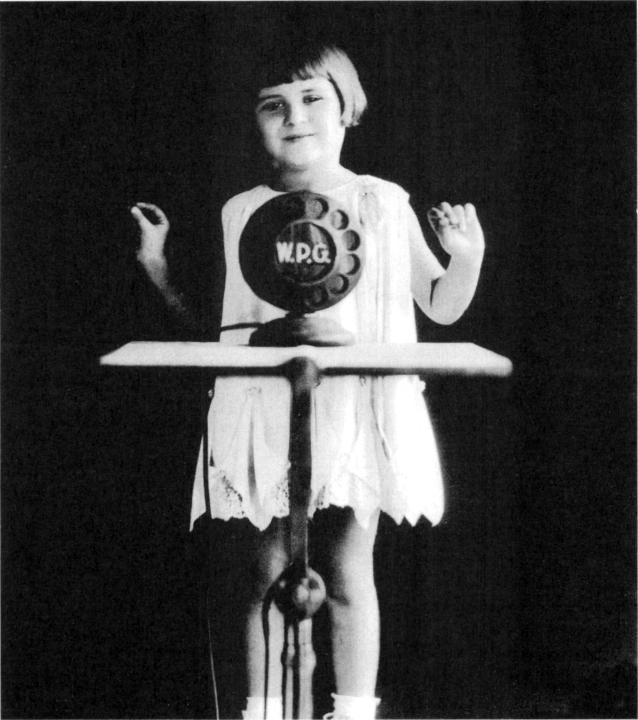
At age four, WPG Radio, Steel Pier, Atlantic City, New Jersey

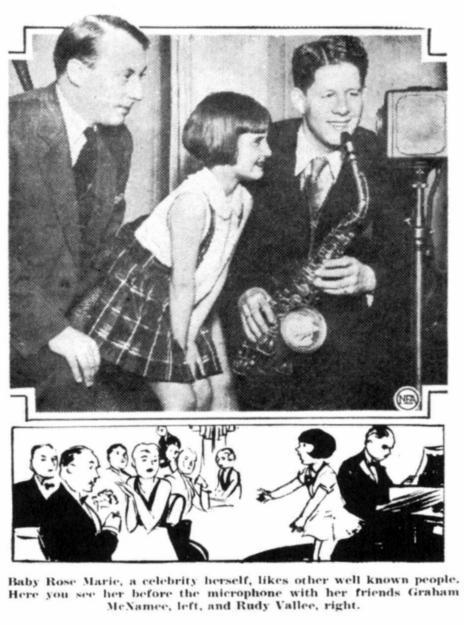
Early media coverage
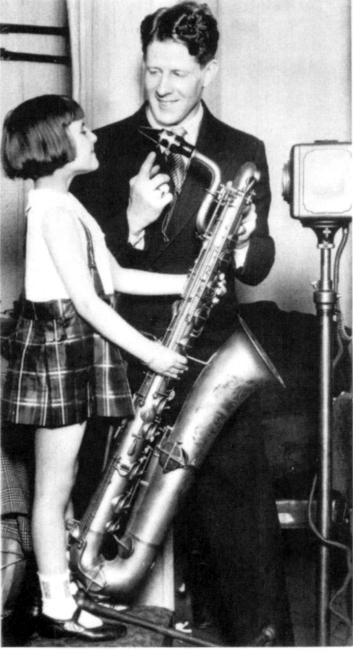
With Rudy Vallee
After the Orhbach Hour, NBC Radio Network called my parents
and wanted to talk to them about signing me to a seven-year contract. This
was quite unusual because NBC had only a few artists signed-Rudy Vallee,
Amos and Andy, symphony conductor Leo Reisman, Vincent Lopez, and
announcer Graham McNamara. We went to 711 Fifth Avenue to see a Mr.
Ed Schewing, the head of the NBC Artists Bureau. Miss MacDonald, his
secretary, led us into this huge office-big oak desk, humongous chairs
with red leather and an entire wall of windows overlooking Fifth Avenue. I
will never forget that day!
Mr. Schewing was tall, slender, and very kind. He asked us to sit
down, and then he talked to my father about signing me to a seven-year
contract, assuring my mother throughout the conversation that he would
look out for me. After my father signed the contract and they shook hands,
Mr. Schewing came over and gave me a big hug, saying, "Now honey, even
if you spit, you'll get paid." He then went over to my mother, shook her
hand and gave her a Chinese red-lacquered box of Schrafft's Candy. I think
it was the most expensive gift my mother had ever received. She still has
that red-lacquered box. It's been used as a sewing box, a button box, and so
on. Every time I look at that box I think of that day-when my career
really started to move into the "Big Time."

